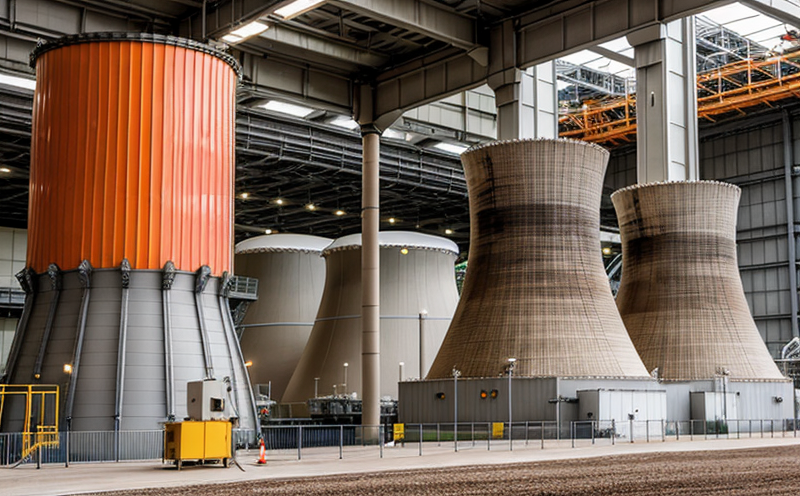ISO 16527 Monitoring Mechanical Properties of Reactor Materials
The ISO 16527 standard is crucial in ensuring that reactor materials used in nuclear power plants are capable of withstanding the harsh environment within these facilities. This testing protocol focuses on monitoring and evaluating the mechanical properties of structural components, which are essential for maintaining the integrity and safety of nuclear reactors. The primary goal of this service is to provide comprehensive data on how well materials perform under extreme conditions such as high temperatures, radiation exposure, and stress.
The process involves several steps that ensure accuracy and reliability in measuring key mechanical properties like tensile strength, yield strength, and elongation at break. These tests are performed using specialized equipment designed specifically for nuclear applications. Specimens taken from reactor components undergo rigorous preparation to simulate real-world conditions as closely as possible, allowing for precise measurement.
One of the most critical aspects of this service is understanding the long-term behavior of materials exposed to radiation. This involves not only immediate mechanical property measurements but also assessing potential changes over time due to irradiation effects. The results from these tests play a vital role in selecting appropriate materials for new reactor designs and ensuring existing structures remain safe throughout their operational lifecycles.
Compliance with ISO 16527 is essential not only because it provides confidence regarding material performance but also because many regulatory bodies require adherence to this standard. By offering this service, we help our clients stay compliant while providing them with valuable insights into the suitability of different materials for specific applications within nuclear power plants.
Our team of experts understands the nuances involved in performing these tests accurately and consistently across various types of reactor materials. We employ state-of-the-art facilities equipped with advanced instrumentation capable of detecting even minute differences in mechanical properties, ensuring reliable data that can be trusted when making decisions about material selection or modifications to current systems.
In summary, ISO 16527 testing is an integral part of maintaining the safety and efficiency of nuclear power plants. By offering this service, we contribute significantly towards achieving these goals by providing robust evidence supporting the use of suitable materials in critical areas of reactor design.
Industry Applications
The application of ISO 16527 monitoring extends beyond just safety considerations; it also plays a significant role in optimizing reactor performance and extending operational lifetimes. In addition to ensuring that materials meet the necessary strength requirements, this testing helps identify any potential weaknesses early on, allowing for proactive maintenance plans before issues become critical.
For R&D engineers looking into novel alloys or composite materials for next-generation reactors, ISO 16527 provides a standardized approach to evaluating their mechanical properties under simulated reactor conditions. This ensures that innovations are thoroughly tested before being implemented in actual facilities, reducing the risk of failures during operation.
Incorporating this service into procurement strategies allows companies involved in nuclear power supply chains to verify that suppliers meet stringent quality standards. It reassures buyers that they are acquiring materials suitable for demanding environments without compromising on safety or performance.
Moreover, compliance with ISO 16527 is increasingly becoming a requirement set by international regulatory frameworks governing the construction and operation of nuclear facilities. Adherence to these standards not only ensures legal adherence but also enhances reputation among stakeholders who prioritize safety and reliability.
Quality and Reliability Assurance
The importance of quality assurance in nuclear power cannot be overstated, given the high stakes involved in maintaining safe and efficient operations. ISO 16527 plays a pivotal role in this regard by providing a robust framework for assessing mechanical properties that directly impact reactor integrity.
Our team adheres strictly to international standards during each step of the testing process, ensuring consistency and accuracy across all samples analyzed. This level of precision is crucial when dealing with materials subjected to extreme conditions such as those found inside nuclear reactors.
The results obtained from ISO 16527 testing serve multiple purposes beyond mere compliance. They act as a benchmark against which future performance can be measured, helping predict how well materials will hold up over extended periods under challenging circumstances. This information is invaluable for both ongoing projects and long-term strategic planning within the nuclear sector.
Furthermore, by utilizing state-of-the-art equipment capable of detecting subtle variations in mechanical properties, we ensure that even minor deviations from expected values are captured accurately. Such detailed data helps pinpoint areas requiring improvement or further investigation, leading to continuous enhancement of materials used in reactor construction and maintenance.
In essence, ISO 16527 monitoring is more than just a compliance requirement; it represents an investment in long-term reliability and safety for nuclear power plants worldwide.
International Acceptance and Recognition
The international recognition of ISO standards has made them the gold standard for quality assurance across various industries, including nuclear power. The acceptance of ISO 16527 within this sector reflects its significance in ensuring that reactor materials meet stringent safety requirements.
Globally recognized organizations such as the International Atomic Energy Agency (IAEA) and regulatory bodies like the U.S. Nuclear Regulatory Commission (NRC) have endorsed ISO 16527 due to its comprehensive approach towards evaluating mechanical properties of reactor components. This endorsement underscores the reliability and credibility associated with adhering to this standard.
Many countries require compliance with specific international standards when constructing or refurbishing nuclear power plants. Inclusion of ISO 16527 in procurement specifications ensures that suppliers deliver materials meeting rigorous quality criteria, thereby enhancing overall safety levels within these facilities.
The widespread adoption of ISO 16527 across different regions indicates its relevance and applicability beyond just a single country’s regulatory framework. As nuclear power continues to grow internationally, the importance of consistent testing methodologies like those prescribed by ISO will only increase.
By offering this service, we not only contribute to maintaining high standards within our own facilities but also support global efforts aimed at improving safety and reliability in nuclear power generation.





